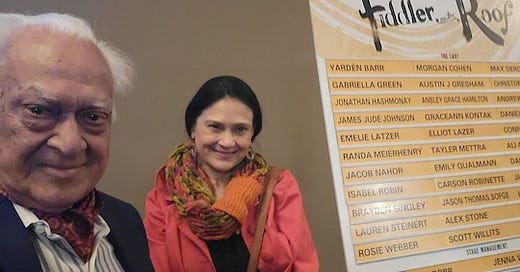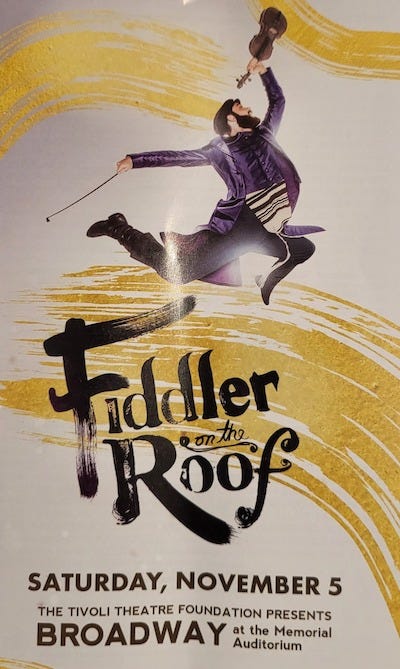Traditions Can Bring Joy and Belonging
But which ones serve the common good and well-being of humanity, and our own well-being, or not?
This weekend I had the amazing experience to see the musical Fiddler On the Roof, which was touring in Chattanooga, Tennessee. I had seen this movie for the first time growing up as a teenager in Goa, India.
I remember enjoying it thoroughly, especially the music. However, it had a different impression on me this time. And not only because I was with my father and dear friend Maria at the theatre. This classic musical invited me to reflect and think about the word tradition.
Intrigued by how consumed I was with this thought, I wondered why now, after almost five decades! Is it because tradition was such a part of my upbringing and the culture I was surrounded by in my childhood years? Is it because I am in a season of my life as a mother, grandmother, sibling and daughter thinking about the many traditions in this world—a world that is so different today, a world that seems to be connected virtually without any boundaries? Is it because I am impacted and influenced by the different issues that are affecting our world today, economically politically, racially, socially, and in every sphere that requires us to exist as humans? Perhaps it is just that I am growing in age? Whatever the reason, this reflection was indeed meaningful?
I grew up with so many unwritten yet gracefully and intentionally role-modeled traditions ritualized each day. These are just a few of the traditions that were critical piece of my culture growing up:
Each morning on awakening, being intentional to smile and offer a prayer of gratitude.
Lighting a lamp and praying before we left the house.
Lighting a lamp at night.
Touching the feet of our elders, making sure we greeted our elders and each other with the hands folded forward in front of us with a bow of Namaste.
Making sure to have at least one uninterrupted meal together as a family daily.
Ensuring no visitor left our home without being offered a food or beverage.
Greeting and acknowledging each human being with a respectful welcome, irrespective of their status as workers, juniors, house helpers or important VIPs!
I have still followed these traditions, role modeling them for my children and grandchildren. Traditions connect me to my past, who I am today, they connect me to my family and my community and reinforces the gratitude that I feel for all the contributions they have made towards who I am today. The practice of these traditions as a ritual gives me a sense of belonging and comfort.
Traditions connect me to the faith and values that I was brought up with. I am reminded of my personal responsibility and the common teaching of respecting, honoring, and acknowledging each other as human beings irrespective of status or beliefs. Traditions bring joy and a feeling of fullness. Traditions helped to promote and create a community and culture of care, kindness, and respect.
However, as I reflect, I am invited to think about the role of traditions in the current era of seamless connections via virtual and social media, facilitated by easier opportunities for travel. What is the role of this timeless universal essence that the traditions came to embody?
Just as we evolve, our world and its culture around us has evolved and so our traditions cannot be static. They too can evolve to meet the changing contexts in the world. Because these traditions are a part of our history, we have to know and understand our history if we want to be intentional and wise in defining our future. We need to understand the values and intent behind the practice of these traditions before dismissing, forcefully mandating, or judging them in any way.
Just as culture changes with time, traditions are not cast in stone; they too can evolve constantly to meet these changing times. However, I say this with caution as this change needs intentional introspection, community reflection, and a constant united focus on what is the common good for humanity. Any and all traditions— whether personal, professional or societal—should always value a common humanity, a culture of respect and kindness, embracing all and intended to lift and empower each other whenever possible, and always always ensuring no harm.
It is up to each one of us to decide which traditions serve us and the greater good— which need to be modified and which are possibly irrelevant. It is up to to us to practice this as a ritual with courage, compassion, and intentionality.
REFLECT: Which traditions do you value and practice?
As 2022 comes closer to turning to a new year, how do you tend to self-care, community and resilience? I will post reflections on these themes and invite you to join in the conversation here or on Twitter or Instagram with your thoughts or what you are doing for self-care and care of others. My book explores such ideas too: Resilient Threads: Weaving Joy and Meaning into Well-Being.
Also see resources related to the Oath to Self-Care and Well-Being, a supplement to the Hippocratic Oath.






https://anjuanand.substack.com/p/42-days-to-the-new-year-42-days-to
While choices and preferences define an individual, traditions define a culture, community, and society. Traditions involve interpersonal relationships as well as the role of each individual in ecosystem of the planet.
Traditions are manmade. They are not the dictates. Divinity of any faith or religion only provides the template or the guidelines for traditions. Hence, they are not absolute, but relative. They should evolve with time and with the prevalent environment of the society.
Traditions are essential for the coherent existence of family and community. They provide discipline and stability and prevent disintegration and fragmentation of the family as well as society.
Traditions are not inherited but imbibed and nurtured as part of the experiences as we grow. They are time tested and sustain themselves by the stability they provide over the time. Their value cannot be predicted but invariably established by hindsight.
Traditions should not be imposed by force or cohesion. They should be integrated in our lives as a pleasant routine and not as unpleasant burden.
Traditions are not flimsy like a feather in the wind. They are solid like the roots that prevent uprooting in any catastrophe, natural or otherwise.
Traditions must sustain the human values and at the same time reflect their changing pattern so as to remain relevant with the time.
Traditions not only relate to humans but also include our relationships with other constituents of the planet, be they living entities like animal and vegetative forms, nonliving objects like the rivers and mountains, or the energy resources from the environment.
Traditions should always lead towards the positivity and be helpful rather than hindrance to the progress of the individual, family, and society. Those traditions that fail to keep pace with the changing paradigm of the times should be modified according to the social needs.
Traditions should not be taken for granted. They are not mere practices to be followed blindly. It is obligatory for those who impose them to convincingly explain their value and the necessity for their integration in our day-to-day life.
Any practice that hurts or harms an individual, family or community cannot be condoned in the name of traditions. Traditions must uplift and empower the society rather than drag down the human values and social progress.
One should take pride in their traditions and not shy away from their practice. It is not easy; it requires courage and conviction which comes from understanding their importance. At the same time, one should not be a slave of traditions, specially those that act like shackles and retard the progress of individual or society.
Time has taught us that those cultures that followed their traditions wisely survived, while those that either surrendered their tradition or resisted their progressive change disintegrated.
Any stable culture and society of today is an ample proof of the importance and value of their traditions, very well tested over the times and against all the odds.
We should bloom where we are planted by our destiny; but we should never forget our roots and we should be proud of our traditions.